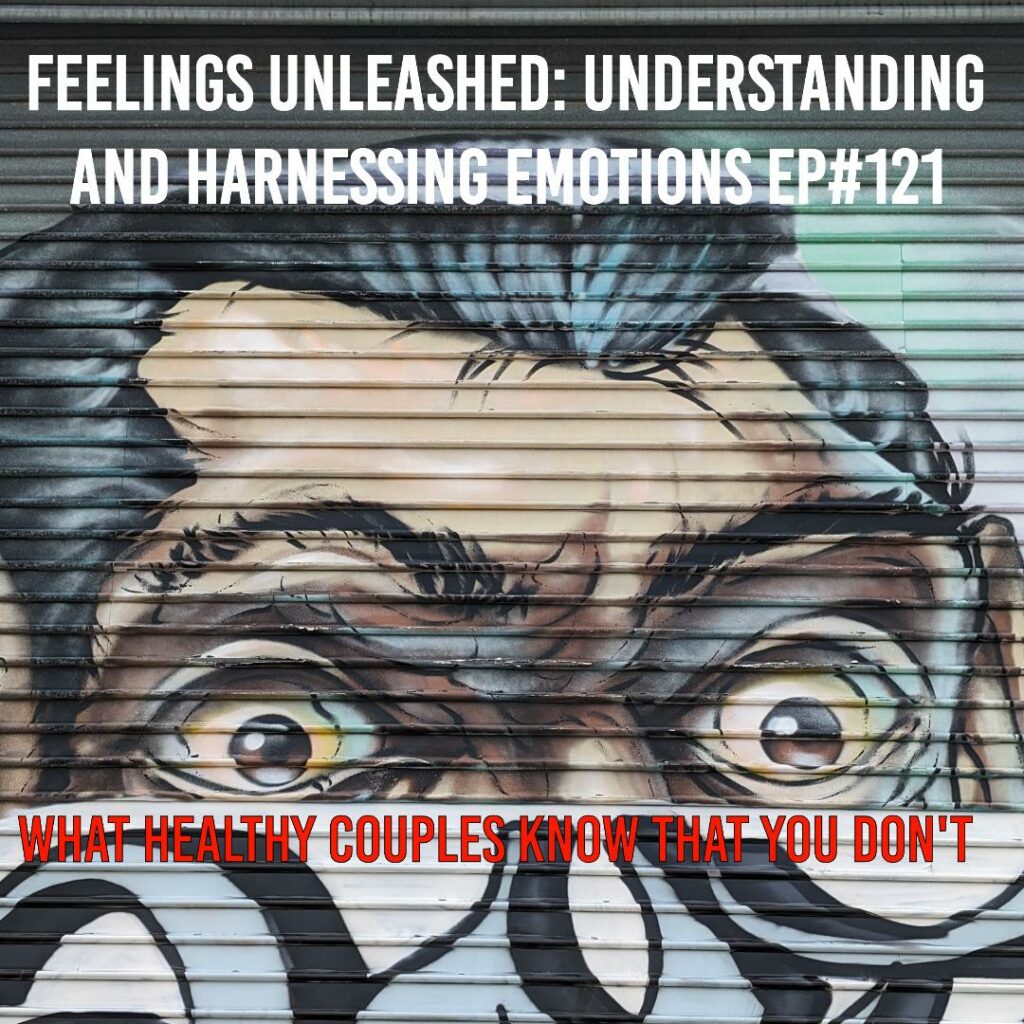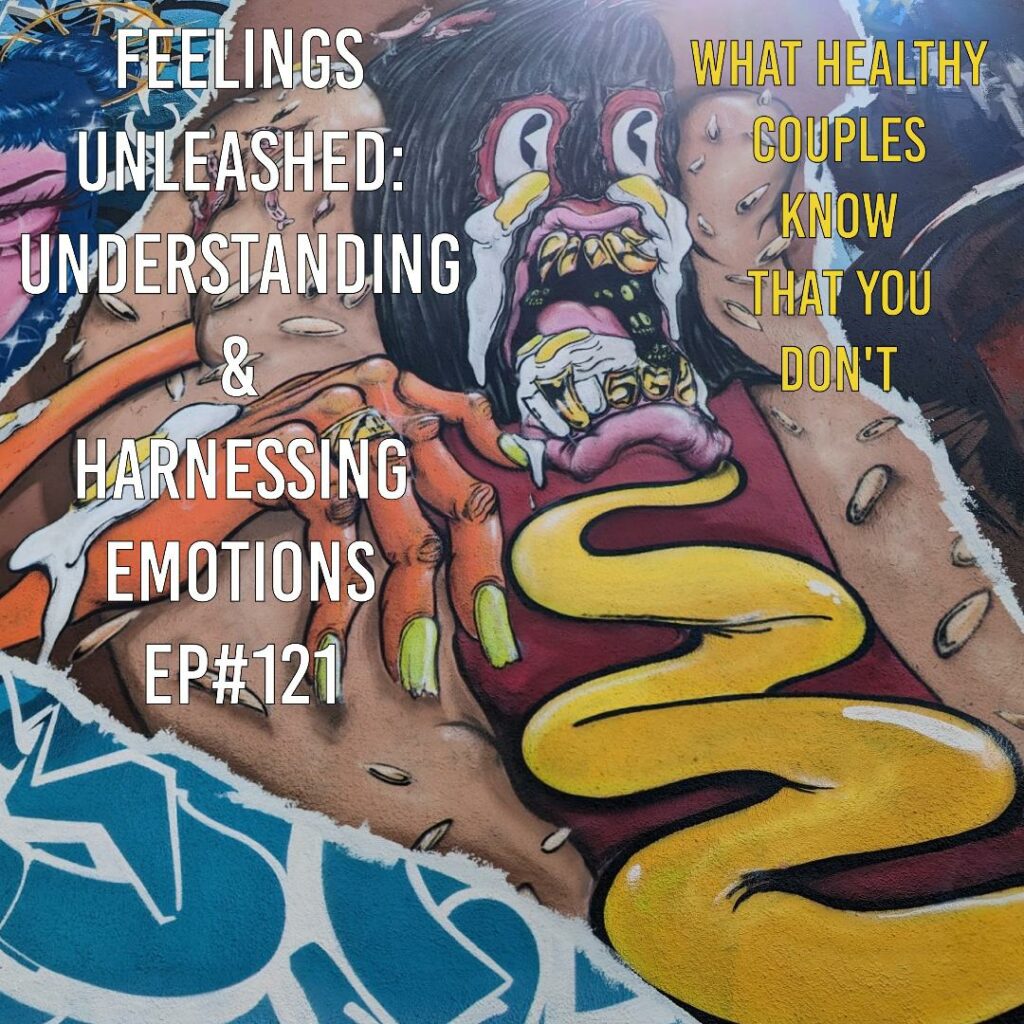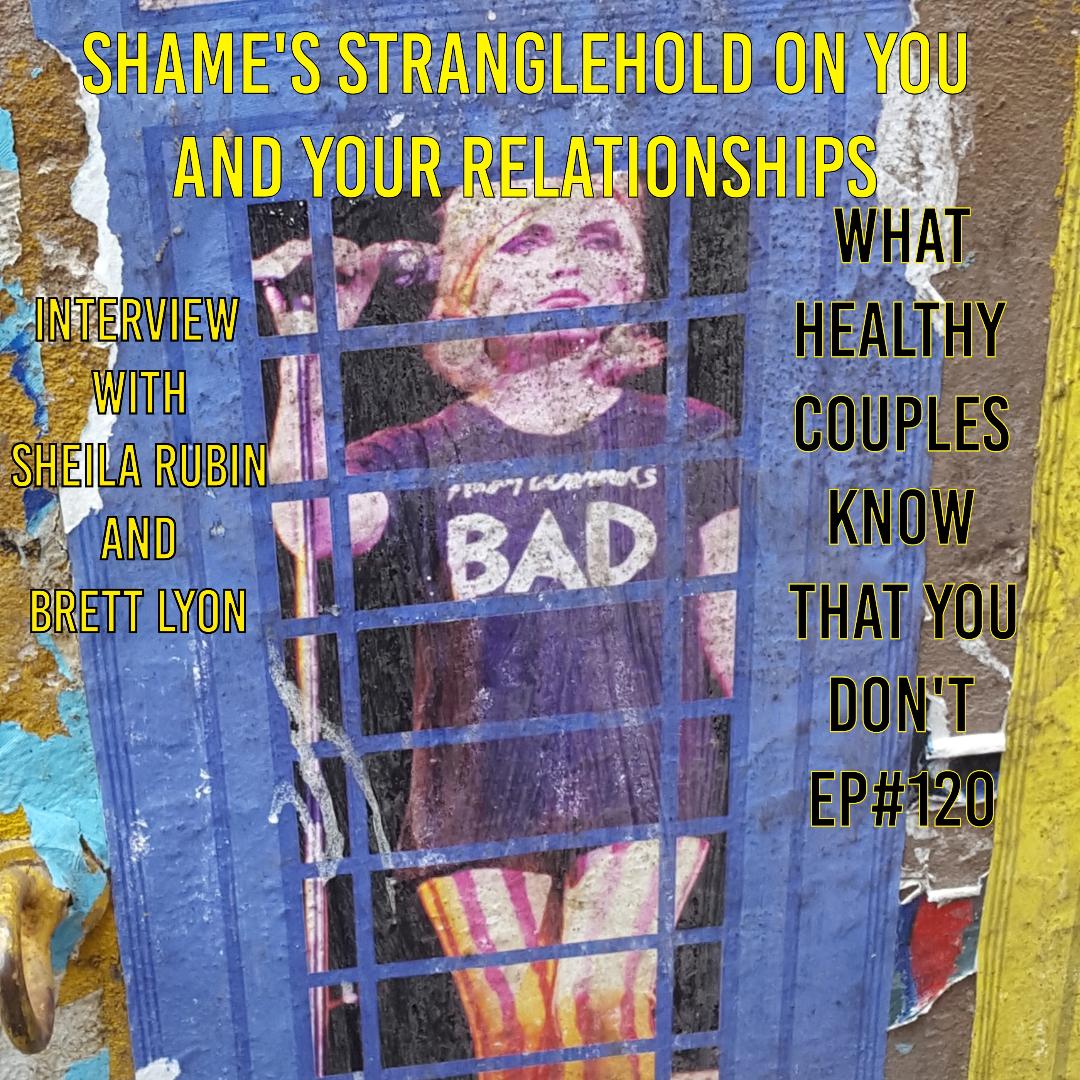Emotions are messy and confusing – they can so easily take us for a ride. Loneliness can carry us into bad relationships. Our fears can keep us isolated & prevent understanding others. Our shame can ruthlessly feed self-doubt & self-torture. Our resentments & unspoken anger can keep us stuck. We are unable to communicate decently if we don’t have emotional balance.

Feelings Unleashed: Understanding & Harnessing Emotions
Emotions are messy and confusing – they can so easily take us for a ride. Loneliness can carry us into bad relationships. Our fears can keep us isolated. Our shame can ruthlessly feed self-doubt & self-torture. Our resentments & anger can keep us stuck. We are unable to communicate decently if we don’t have emotional balance.
What to do about this difficult business of emotions? The first step in understanding emotions is to identify them. So many of us lack a feeling word vocabulary that I’ve got two pages you can print out on the emotions page of my website, www.therapyideas.net. Print them out and select four or five words that fit how you are feeling,
Even better if you have a partner to share them. Research shows that naming our feelings makes us happier. In 2018 UCLA Professor Matthew Lieberman found putting feelings into words reduces the intensity of feelings because it activates the prefrontal lobe and decreases the amygdala.
So the beginning of improving your emotional balance is identifying and then practice sharing. This leads to moving through a range of feelings. Movement is mentally healthy, feelings are not invested in lingering unless you ignore them and pretend they aren’t there. The other extreme would be obsessing about feelings so much you spiral and fail to take any action. Feelings deserve the messy middle ground in between these two extremes which would be to lean into them for a bit, then back up for a wider perspective. When you lean in, you explore a bit, any wants lying around inside the feeling? Any hurt you need to let somebody else know? Any unfinished business? With unfinished business it helps to write an unedited letter you don’t send to explore what’s there.
You also can ask yourself what is the opposite of this feeling I’m not paying attention to? For example, often fear erases it’s opposite polarity which is . . . . . stop right now and try to imagine what it might be.
Often the opposite of fear is excitement. Fear squelches our sense of adventure, excitement helps us leap over the scary beginnings.
The opposite of feelings are one of my favorite things to ponder. Let’s take another “negative” feeling: Anger. Think of something you have no ability to change. Often times the opposite of anger is acceptance, accepting our powerlessness. The purpose of boredom is to push us into its opposite which is creativity.
There isn’t one right answer of what is the opposite, there is only your answer. Often when I ask this question, clients look at me blankly. This question creates a pause to the feeling. The third step is to be able to interrupt the high intensity path so many feelings pursue, the pause as you’ve heard in so many interviews is crucial to greater emotional balances. The pause offers you a change to think, thinking can contribute to balance. We can manage our own reactivity by thinking differently about the problem.
When we overreact we dump out a lot of garbage, a lot of unsaid, secret ugly thoughts. The pause engages your prefrontal cortex, our grown up balance to our lizard brain, the amygdala. If you can’t even begin to think how to pause, then try wearing a rubber band on your wrist and snap it to remind yourself to pause, take ten breaths breathing through you nose and out through your mouth. A pause will help you prevent attacking by reacting. -Attacking is using more anger than you need.
When FEAR is a primary emotion it is often determined to cover up anger because your fear doesn’t like the messiness that anger creates. This is why so many back away from friendships because being annoyed & not saying anything becomes the way to avoid more messiness. When in reality these are opportunities to practice small moments of genuineness which will deepen the relationship & teach you to tolerate the messiness of BOTH people’s differences in a relationship.
When we react we are working backwards focused only on our own hurt & upset. It becomes almost impossible to recognize the other person’s intention. I learned from my dear friend & colleague when I was sharing a personal dilemma, that an excellent question to ask someone else in these moments instead of reacting is “Can you help me understand…” Then you are working outward to incorporate the other person into what the problem is…it’s so easy to lose perspective of both people involved. We all love a bit of self-righteousness don’t we?
Let’s explore anger because that is a core part of reacting so quickly to stay on top of whatever the mess is that is going on. Many families squelch anger because it’s not nice or dump it like the Christmas scene in the tv show The Bear (more on this show at the end of the episode). So anger is treated like a second cousin to fear. You can’t really be self aware unless you understand your relationship to anger.
Pain has anger wrapped around it, either covertly or overtly. Let me say this again, it’s that important, Pain has anger wrapped around it, either covertly or overtly. Consider the profound pain locked inside divorce or death. There is huge anger that needs to be unlocked.
Passive aggressive is when anger leaves the other person really uncomfortable & confused. Being passive aggressive is when someone is really super defended against messy anger.
So understanding & owning your anger is key to success with your emotions. Making choices about how to handle your anger instead of knee jerk swallowing it & stashing it for future use in a giant dump or spilling it all over others by reacting.
The fourth step is considering the purpose of emotions. There is meaning and purposed that in the heat of the moment we so easily lose track of. So let’s explore some ideas about this.
Why is anger in the toolbox of emotions? Anger is a way to bring you back to yourself; to help you hang onto how your are different and unique. This is why so many adolescents are exploring their anger in order to seek their identity differentiated from their parents. Anger contributes to your liveliness.

Guilt is like a compass. It helps orient you, it’s important to recognize obligation which helps you make a reasonable sacrifice to do the right thing even when it’s hard. When you are swimming in guilt it often means you’re really angry & resentful because you feel locked into doing an unreasonable amount of sacrifice.
The feeling of being responsible is the ability to respond. It’s best if we can be open to responding in any way that is life-enhancing.
Gratitude is a feeling of enough, something we Americans too easily lose track of. Bettye LaVette has a powerful song “I Do Not Want What I Haven’t Got” that I want played at my funeral, it’s so beautiful.
The feelings for sex and desire has the purpose of pleasure. Again in America we seem to get stuck in the extremes of too much and too little.
The reason for sadness is to help us digest loss and to make suffering more bearable. It reminds us of our own aloneness. Sadness teaches us to be small & humble about our small part in the universe.
Pride teaches us to be bigger and take up more room. This is why I like the term “quiet dignity”.
Courage helps us stand up and be counted. Courage makes our world bigger. So we explore & adventure.
Fear reminds us of danger. How many times have you shouted at the TV because some idiot is going to be hurt, because they go it alone & don’t wait?
Loving requires courage and because of our fear we are too often silent about loving someone. Loving teaches us to connect from small, cute ways like my friend Jim who is an expert at doing this with everyone he meets which makes so many people feel seen. There is also the deeper level of intimacy, asking and answering questions that share the hard parts without sidestepping the messiness of vulnerability.
Jealousy can just be pin pricks of what we want, clues to a more interesting life. Too much jealousy can turn into the ugliness of possessiveness.
Resentments are so often silently collected and stashed. Then we so easily cash them in a very entitled dump. Resentfulness is to feel something again and again; we nurture the feeling like a possession which is more comfortable than sharing a hard truth with someone else.
Joy is the experience of freeing yourself. We just saw the play Fat Ham which is an expression of pure joy that had the entire audience up on it’s feet singing, clapping & wishing there was room to dance. A terrific Black, Queer version of Hamlet that rocks!
When you forgive yourself you forgive others. Forgiveness is unlikely to happen if you haven’t blamed first.
Shame helps you dig a hold into misery, or you can embrace it and learn from it. (Previous episode #120 is all about shame)
Depression constricts our excitement, the hopelessness of depression protects you from disappointment. Curiosity can be a bridge to begin to leave depression behind.
The Buddists define 3 Poisons: Hatred to be balanced with kindness; Greed which is grasping and needs to be balanced with generosity; Delusion which is ignorance and lack of attention. One example of this would be the fantasy of porn daily and no sex life with your partner is a dangerous delusion. Wisdom which is recognizing that reality matters, & facing hard truths about yourself.
Fifth Step. So the secret to emotions is to face them head on, be alive to them but not controlled by them. This requires what I call emotional bravery. Instead of avoiding them, explore and be curious, chew them over and spit out the unworthy parts.
I believe that it is insecurities that rob us of our emotional bravery. Our insecurities can be influenced by others. I remember sitting with my Dad in the front seat of his electrician’s work truck, which he owned, and told me that “life is not a bowl of cherries, Rhoda.” So vivid in my head. My favorite therapist Sonia offered this balance to me: “Greediness can be a fine appetite for life” which restored my zest for life. A nurturing moment I’ve never forgotten.
So balance your insecurities with learning to be more grounded by understanding your feelings which helps build your identity and what really matters to you. We are all fingerprints, unique in who we are and what makes us tick. Feelings can lead the way.
A sixth step. Don’t rob yourself of confusion, we all love the comfort of certainty and yet uncertainty is a huge part of life. Confusion is something to be appreciated and enjoyed because growth can only occur in confusion, certainty doesn’t lead to change. So enjoy the confusion, stay with it instead of shutting it down and it will lead to change. You have to tolerate confusion, obsession is a substitute for action, it’s not the same thing as confusion.
We are not tranformed by new knowledge but by a new knowing in a different way. People who learn well are willing to be awkward and carry their fear and discomfort with grace. You have to support your own unease. Anxiety is not accepting uncertainty.
Laura Perls, leading a training group in 1984 said “we place our bets and make choices about the maybes of life.”
Embracing Uncertainty by Susan Jeffers is a terrific book to help you make uncertainty more bearable. Life requires a hell of a lot of uncertainty!
I want you to use the last episode of season two of “The Bear” to give some examples. I kept this last because many of you may not have had the opportunity to watch it. So this part of the episode will come after the homework, which is next.
Your Homework: Stay curious and open to feelings. When we are defensive we jump so early into feeling rejected. Defensiveness interrupts what we can learn. Try to avoid rejection sensitivity. Go to your kids and ask for two ways you could be a better parent. Go to your supervisor and ask for two ways you could be a better employee. Go to your partner and ask for two ways you could be a better person for them. Don’t forget to print out the vocabulary list & use it! In 1980 when I was working with incest victims and learning from them what was needed I developed a technique of a feeling on a stack of index cards & asked people to pick a few that fit how they were feeling. It proved incredibly helpful.
The Bear on Hulu in the States is a master class in our humanity & our messiness with emotions. When Richie tells Carey he is like his mother it throws Carmy is over the cliff, he ends up drowning in Shame & self Hatred which leads to tremendous collateral damage with his girlfriend. Sydney the perfectionist doesn’t ask for help & ends up throwing up from stuffing in all her feelings. Productive perfectionists will stuff their anger. Carey is truly confused that he has a girlfriend until Sydney helps him identify she is more than a friend who is a girl. Confusion is a good thing that can leave us open to change. Last but not least Sugar’s husband clearly in so much pain when he’s asked to keep the secret that his mentally ill MIL (Jamie Lee Curtis) showed up. Secrets benefit the person who wants the secret, not anybody else. This show is a buffet of emotions and much can be learned from these beloved characters who have captured reality so beautifully!













